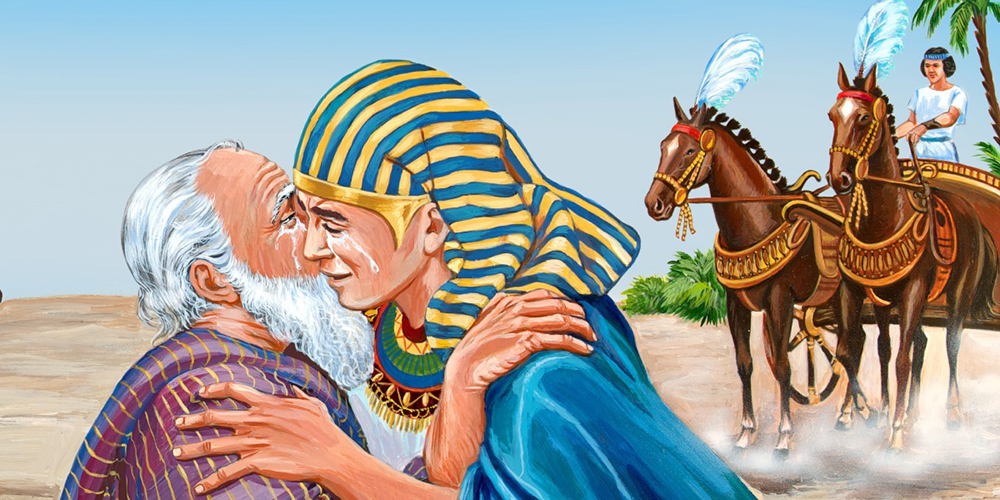Bonjour / Hello [nickname_else_first_name],
Table of contents
1) Perashat Hashavoua - Rabbi Eli Mansour
2) Halakhat Hashavoua (Halakhot related to day to day life) By Hazzan David Azerad - Laws of Hannukah
3) Holy Jokes!
1)PERASHAT HASHAVOUA
This Week's Parasha Insight with Rabbi Eli Mansour
Parashat Vayigash- The Antidote to Adversity
The Torah in Parashat Vayigash tells of Yaakob Abinu’s move from Eretz Yisrael to Egypt with his entire family. We read that Yaakob went to Egypt together with "Kol Zar’o" – "all his offspring" (46:6). The Torah then seems to unnecessarily repeat this point, that all of Yaakob’s offspring joined him in Egypt: "His sons and his sons’ sons [went] with him; his daughters and his sons’ daughters and all his offspring, he brought with him to Egypt" (46:7).
What does this second verse add? Once we’ve been told that Yaakob went to Egypt with all his offspring, why does the Torah then need to specify his sons, his sons’ sons, his daughters, and his sons’ daughters?
The Or Ha’haim (Rav Haim Ben-Attar, 1696-1743) offers a fascinating explanation of this verse, suggesting that the Torah here is delineating two different groups of Yaakob’s offspring. The first group "went with him," just as he did, with the same mindset and outlook. Yaakob knew that he and his family were going to Egypt to begin the fulfillment of the prophecy given to his grandfather, Abraham, that his descendants would be persecuted in a foreign land. He understood that this was not going to be easy or pleasant, that his offspring were going to suffer terribly at the hands of the Egyptians. Nevertheless, he went to Egypt wholeheartedly, fully accepting Hashem’s decree. The verse here tells us that Yaakob’s "sons and his sons’ sons went with him" – meaning, they went to Egypt in the same manner as he did, without any ambivalence or hesitation, trusting in Hashem. There were others, however, about whom the verse says, "he brought with him to Egypt" – implying that they needed to be coerced into moving to Egypt. This group did not have the same level of faith, and were hesitant to begin the decree of exile and persecution.
After presenting this interpretation, the Or Ha’haim references the teaching of the Midrash (Shemot Rabba, 1) that the bondage did not begin until those who had moved from Canaan to Egypt had passed away. It was only after that generation in its entirety perished that G-d brought the pain and suffering of slavery upon Beneh Yisrael. The Or Ha’haim explains, "Perhaps this was for them a reward for willingly accepting the King’s decree…for the remedy for suffering is acceptance."
In this passage, the Or Ha’haim here reveals to us the answer to one of the most frequently asked questions asked by believing Jews: How should we respond to our problems and troubles to make them go away? The Or Ha’haim identifies for us the "antidote" to adversity, stating, "Sama De’yisureh Kabuleh" – "the remedy for suffering is acceptance." If we want to spare ourselves troubles and hardship, we need to accept everything that Hashem decrees should transpire. Yaakob’s family members who went to Egypt wholeheartedly, undeterred by the decree of hardship, were rewarded by being spared that decree. This is the remedy – to humbly and unquestioningly accept everything that Hashem does.
The Or Ha’haim concludes this passage by referencing a comment by the Zohar (Vayakhel, 198a) explaining the verse in Tehillim (146:5), "Ashreh She’Kel Yaakob Be’ezro, Sibro Al Hashem Elokav" – "Fortunate is he who is helped by the G-d of Yaakob; who places his hope in Hashem his G-d." The Zohar states that the word "Sibro" ("his hope") should be read as "Shibro" – "his crisis." In times of crisis and hardship, we need to reinforce our Emuna, our belief and conviction that everything Hashem does is for the best. If we do, then we transform "Shibro" into "Sibro" – we bring hope into an otherwise painful and overwhelming situation.
We all occasionally find ourselves dealing with adversity in one form or another. The Or Ha’haim here teaches us that the most effective remedy which we can make use of to help ourselves during periods of hardship is Emuna, placing our faith in Hashem, and accepting everything He does without questioning Him.
2) HALAKHAT HASHAVOUA
Halachot this week are selected and Translated by Hazzan David Azerad
The Laws of reciting Berachot, according to the rulings of Rabbi Obadiah Yosef ZT”L
What is the severity of reciting a blessing that is not needed?
A person must try not to be in a situation in which he will recite a Beracah that is not needed (in vain –Beracah Levatala ).By doing so it is as if you are swearing in vain and it is forbidden to answer Amen after such blessing.The prohibition of reciting a Beracha Levatala is from the Torah, and therefore when you have a Safek (doubt) if you had already said the Beracha or not ,Halacha commands us not to recite it (shev Ve’al Ta’aseh).
When there is doubt as to whether one is allowed to recite the Beracha or not,one may recite the Beracha by heart since there is no prohibition to recite blessings by heart
Bevirkat Shabbat Shalom Umrvorach
David Azerad
3) HOLY JoKeS!!
Selection of funny snippets, loosely related to this weeks parashah or current events, to brighten your day
Where do you see a hint to tennis in the Torah?
YOSEF SERVED IN PHARAOH’S COURT!
But of course, because Pharaoh ruled Egypt before Yosef, that means that PHAROAH SERVED FIRST!
How much does a tennis game in Israel cost?
TEN NIS (Israeli New Shekel; Israel’s currency).
What is Fiveish’s favorite sport?
TEN-NISH!















